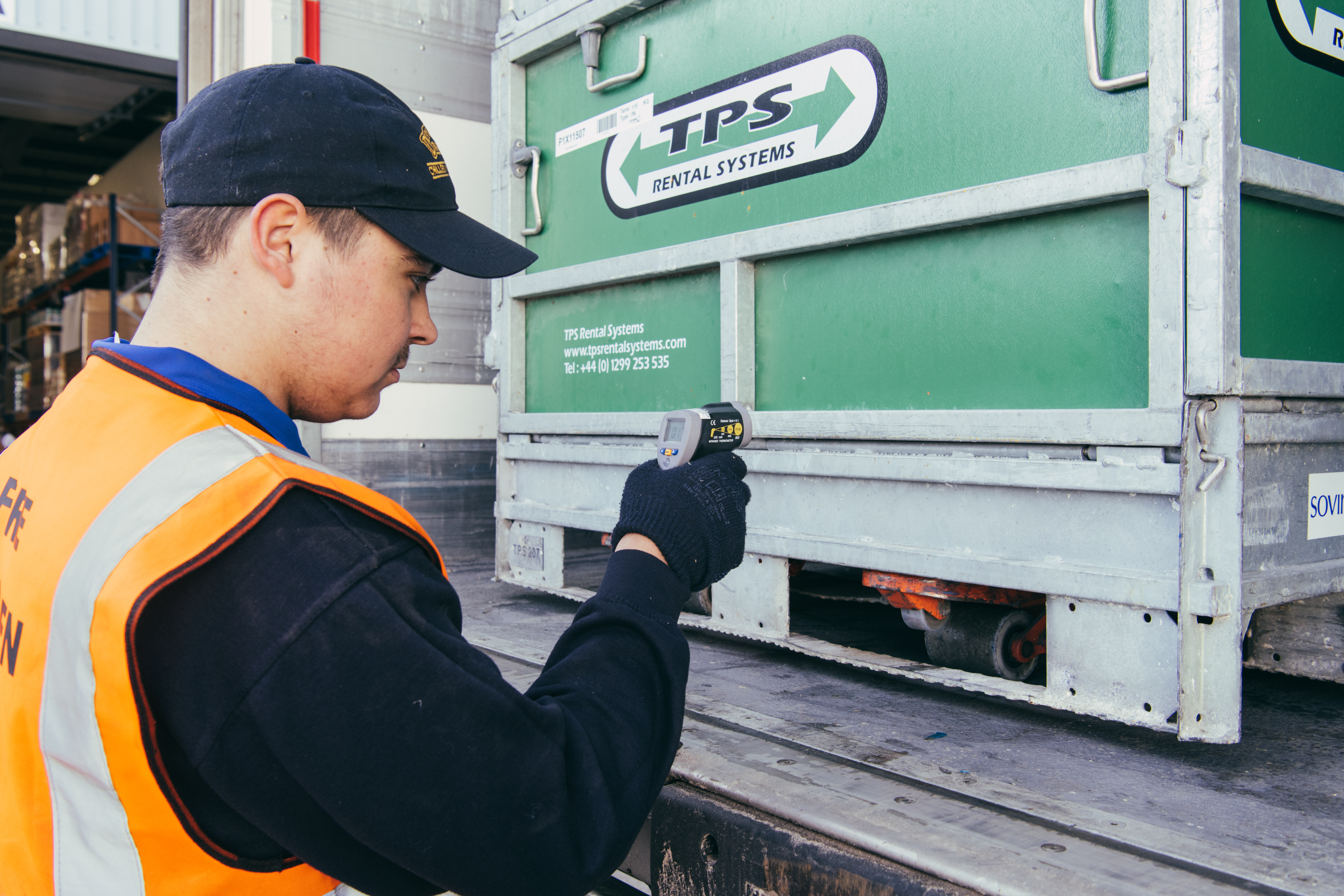November 2020:
After so many months of making a loss, Hannah said the company is keen start rebuilding.
“Our focus is on clawing that back [the money that was lost] so that we can rebuild to where our targets are meant to be, but always keeping in mind the health and safety of our staff,” she explained.
Being a small business, having all hands on deck is essential and Hannah said that keeping staff in work was one of the biggest challenges at the moment.
“We don’t have much slack in the team in terms of being able to cover absence, which is probably where we’re finding the biggest challenge at the moment. We haven’t had many instances where people have had to self-isolate, but where people have, it’s put a big strain on our team.”

Hannah went on to say that her team have also put extra resources into helping staff through this period of uncertainty.
“The onus we put on our managers and supervisors was to check in with their staff, check on how their families are doing,” she said.
“The beauty of a smaller team and a family-run business is that you know your team, so we really pushed managers to take that extra bit of interest.”
Recognising that not everyone would feel comfortable talking about their worries and issues with colleagues, Dunsters Farm also set up a dedicated wellbeing page on its website.
“We put a page on our website for the staff with resources that they could get hold of, whether that be about mental health, or wellbeing, or support,” Hannah told us, adding that she knew everyone was dealing with lockdown differently.
In order to boost morale and team spirit, the company also introduced daily meetings at the start of lockdown and have continued to make the time every day.
Although it may be different from usual, Hannah is also keen to hold annual award ceremony for staff in January.
“We want to say ‘thank you’ to staff, because they have all done what we asked them to do and, on the whole, that’s been really successful,” she said, emphasising the importance of recognising staff sacrifices throughout the pandemic.
January 2021:
Hannah admits that it would be most beneficial for Dunsters Farm to stop operating during this period in order to reduce losses, but it is to as the business provides an essential service to schools and hospitals.
In response, the company is using the flexible furlough scheme to manage its workforce.
“[Flexible furlough] is a good option as we can keep our staffing levels and reduce them as we need, but it puts a lot of pressure on the ones who are working to keep [the business moving],” she explained.
She said that it was vital to keep communication going to ensure staff morale remained high.
“I think the best thing we did was right at the start, when it all locked down in March last year,” she said. “Since then, we always have a team meeting in the morning.”
“That helped because, every single day, we would all get together and it made people feel like they’re part of a team and that everyone is absolutely essential.”
Hannah also said that she was making a concerted effort to keep in touch with her employees on a more one-to-one basis.
“We just try and talk to people, like literally ring them up and see how they are, whether they’ve been on furlough or not on furlough.”
“In the leadership team, we really try and stay positive – but we show the reality of it as well,” Hannah said of what it’s like to be a leader during this difficult period.
“We did the TV interviews; we’ve done the newspaper articles and said our piece.”
“We’ve shown how passionate we are and hopefully that reflects for our team, that we’re doing everything we can to secure their jobs and the future of the business.”
“I think we’re quite vocal, so we tell the team how we feel, and we encourage them to do the same,” Hannah said of the continued communication between the teams and management.
“I think this lockdown has been so much harder than the others because people are trying to get back to normal, and now it’s just been stopped again.”
She recognised, too, that the on-going situation was difficult for everyone, both those who were on furlough and those who were working full time.
“For the team that have been working, it’s been stressful. I think they feel like there’s quite a bit of pressure on them to get it right,” she went on.
“We’ve just tried to keep a sense of humour about it, like just make a joke about it – we want people to enjoy working. But it’s not been easy. Thankfully everyone has pulled their weight, which is a real positive.”
March 2021:
Throughout our discussions, Hannah’s pride and passion for her staff has come through numerous times.
Now, in a time when staff were beginning to return to work, she was keener than ever to do more for her staff, as well as provide opportunities for younger people to learn in a business environment.
She started by saying that flexible furlough had allowed the company to bring back staff on a part-time basis, which had allowed staff to integrate back into the world of work.
“I know for some of the staff, they came back in on Monday and they were all so glad to be back. I think people need that routine in their lives,” Hannah reported.
“Although some people might see furlough as being paid for not working, I don’t think people in general feel that way – I think people want to work and would rather be getting their full pay and working with colleagues and getting involved.”
Hannah said that one of the main challenges was keeping morale up among staff. Although people were generally feeling more positive, thanks to the vaccine and the roadmap, there was still uncertainty within the business.
“We’re trying to do some sort of survey to try and gauge what people really feel,” she reported.
“People want to have a job that’s secure, and I think they’re all keen to play their part in it,” she went on. I think it’s really focused people’s minds on what’s important.”
“For us, we’re trying to push out those messages of why it’s a good place to work and to try and keep morale up as much as possible.”
Hannah went on to say that a change in the team during lockdown had had a positive effect on staff, with more positive, influential leaders stepping up to boost morale and staff togetherness.
However, she admitted that creating an uplifting, positive atmosphere while everyone was working from home had its challenges.
“It’s hard when everyone’s remote to create that atmosphere, but we’re trying as much as we can,” she said.
“Every Friday, [the staff are] having a coffee catch-up on Zoom, even the ones that are furloughed. It’s just for five or 10 minutes, having a brew and a bit of a chat – nothing related to work.”
“We’ve been calling random members of staff just to see how they are and how they’re coping, but on the whole people are just glad to be back doing something, so that helps morale.”
Although Hannah has given staff plenty of opportunities to engage, she reflected that not everyone wanted to be involved.
Already an issue prior to lockdown, she believed that there’s never a ‘one size fits all’ option that gets everyone engaged, and that adapting social events could help in drawing others in.
She added that, by creating a fun and engaging culture within the business, reluctant members of staff usually became interested in events, although this had been harder to maintain during the pandemic.
As well as ensuring staff morale and engagement, Hannah is keen to give her staff opportunities, from taking on apprentices to ensuring upskilling options are available.
“I think anything you can do to help people get into the workplace and get the training they need is so important,” she said of apprenticeships.
“I think that’s really missing sometimes for young people, so I’m really passionate about it.”
Although a challenge at times, Hannah believes that the fresh ideas from young people who haven’t been ingrained in business can be hugely beneficial for a business.
She also argued that apprentices can be trained in accordance with the business’ vision and values from the start.
“We’ve got a marketing apprentice at the moment,” Hannah explained.
“The ideas that she has aren’t tarnished by the world of work – they’re really fresh and new. Sometimes they’re completely wacky, but that’s fine – she’s come up with some great ideas already within a few weeks, and she’s keen to learn.”
Hannah went on to say that investing time in apprentices wasn’t a short-term project, citing her experience with an apprentice who was now a full-time member of staff at Dunsters Farm.
“She’s a senior customer account executive now and she works with our sales team,” Hannah reported. “She’s an extremely loyal member of staff and really knowledgeable about the business.”
For existing members of staff, including individuals on furlough, Hannah provided extensive opportunities for upskilling.
“We’ve made links with local colleges to enable online training to be done, especially as people have been furloughed,” she said.
“It’s still quite early days, but it’s allowed people to do courses that aren’t just relevant to their role, but things like coping with mental health and keeping fit.”
“There’s also a range where they were able to choose three courses, each to do in their own time or when they were furloughed, and there’s been quite a good uptake on that.”
For skills-based training, the company had joined forces with a group in Manchester.
Hannah had found that older members of staff had been more reluctant to take up the upskilling opportunities, and she believed that this was because they found going back into a learning environment, especially an online one, daunting.
“We’ve had a little bit of kickback on people that perhaps don’t think they really need any training or don’t want to train virtually, so it’s important to get a balance,” she added, maintaining that upskilling was nonetheless vital for the business.
“It’s worse if you don’t train them because you’ve got a person that’s stuck with you for life,” Hannah went on.
“They’re never going to move anywhere else because you’ve not trained them or upskilled them, but they’re really not skilled enough for the job [in the first place]. Then you have to bring in external people [at extra cost].”
Hannah believes that, by celebrating the achievements of those involved in upskilling, it boosts morale amongst staff.
“We’ve been doing a Friday email to share something positive with the team. This week I’m going to do a shoutout to [people on courses] – it’s little things that make it feel worthwhile to them.”
Leadership




